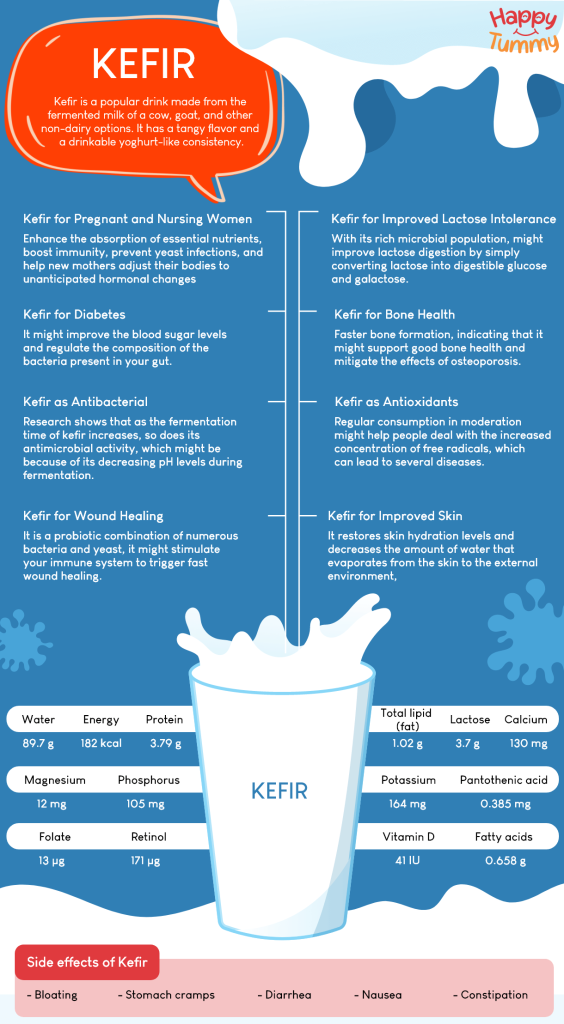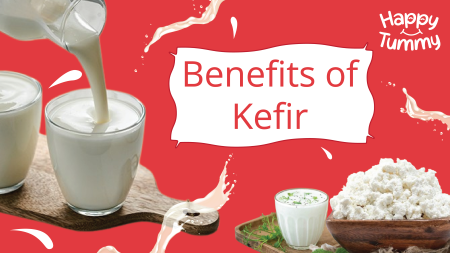Table of Contents
When it comes to finding the right beverage that not only quenches our thirst but also provides nutrition, kefir is one popular recommendation. It is a staple food across the globe, with many communities consuming it due to its high nutritional value. Many people believe that kefir, pronounced kee-feer, originated in the Caucasus Mountains of Russia [1].
Kefir drink is produced using kefir grains, which, in simple terms, are a combination of bacteria and yeast. Moreover, it is also widely believed to be a rich source of vitamins, amino acids, alcohol, and other essential compounds that may contribute to your overall health. [2]
Over the years, the use of probiotic foods has increased as a natural source of good health-promoting bacteria. Consequently, this beverage has reached numerous countries, including India.
However, many people are unaware of how this beverage can support their health. This blog will explore 8 benefits of kefir, its nutritional profile, how to include it in your diet, and more helpful details.
Let’s begin.
What is Kefir?
Kefir is a popular drink made from the fermented milk of a cow, goat, and other non-dairy options. It has a tangy flavour and a drinkable yoghurt-like consistency. Moreover, it is a combination of milk, kefir grains, yeast, and bacteria. As it is made using fermentation, it has a slightly carbonated flavour.
This beverage uses kefir grains, which also act as a kind of yogurt starter. They are white to yellow in appearance, gelatinous, and might range in size from small to medium accordingly.
The term kefir comes from the Turkish word “keyif,” which loosely translates into “good feeling.” It is believed that the drink got its name from the pleasant feeling the person experiences after drinking it.
Nutritional Profile of Plain Low-fat Kefir
Below is the nutritional profile of 100g of plain low-fat kefir. [3]
| Water | 89.7 g |
| Energy | 182 kJ |
| Protein | 3.79 g |
| Total lipid (fat) | 1.02 g |
| Lactose | 3.7 g |
| Calcium | 130 mg |
| Magnesium | 12 mg |
| Phosphorus | 105 mg |
| Potassium | 164 mg |
| Pantothenic acid | 0.385 mg |
| Folate | 13 µg |
| Retinol | 171 µg |
| Vitamin D | 41 IU |
| Fatty acids | 0.658 g |
Health Benefits of Kefir
Let us now move on to the 8 amazing health benefits of kefir that might contribute to your overall good health.

1. Kefir for Wound Healing and Energy
It is a probiotic combination of numerous bacteria and yeast, it might stimulate your immune system to trigger fast wound healing. Also, being rich in vitamin B12 makes it helpful to manage fatigue and headaches.
Moreover, the regular consumption might help the body of the consumer fight a number of disease-carrying pathogens and promote good health. Its other essential components, such as lactic acid and acetic acid, may also play an important role in its healing properties.
Research also suggests that kefir has anti-inflammatory properties, which might contribute to its healing properties. [4]
2. Diabetes
Probiotics, such as kefir, are good for diabetes management. Its regular consumption might balance your blood sugar levels. Probiotics, present in kefir, might regulate the composition of the gut bacteria and reduce oxidative stress and inflammation.
Additionally, another study suggested that consuming kefir might lead to a decrease in fasting glucose levels. It might also lower the amount of lipopolysaccharide (LPS) by reducing the amount of gram-negative bacteria. [5]
Moreover, lower amounts of LPS might also reduce the inflammation associated with diabetes. In this way, drinking kefir may further result in more efficient functioning of insulin and better control of blood glucose.[6]
3. Kefir as Antibacterial
Kefir is a popular antibacterial. Its regular consumption might protect you against numerous infections and boost overall health.
As the fermentation time increases, so does its antimicrobial activity, which might be because of its decreasing pH levels during fermentation. [7]
Moreover, research shows that kee-feer samples showed antibacterial effects against bacteria such as E. Coli and other dangerous variations. These antibacterial properties might be because of its plethora of healthy compounds such as organic acids, hydrogen peroxides, peptides, ethyl alcohol, and diacetyl. [8]
4. For Improved Skin
Some people believe that kefir consumption might nourish skin. Research shows the subjects who were given kee-feer for eight weeks showed an increase in skin hydration levels, especially in the forearm and forehead. This significant improvement might be linked to a decrease in the amount of water that evaporates from the skin to the external environment, also known as Transepidermal water loss (TEWL). [9]
5. Kefir for Bone Health
A study shows that the consumption of kee-feer might help people improve their overall bone health. Moreover, its consumption has also been associated with faster bone formation, indicating that it might support good bone health and mitigate the effects of osteoporosis (weak bone strength). [10]
6. Kefir for Improved Gut Health and Lactose Intolerance
Kefir, being rich in probiotics, is wonderful for gut health!
It might add good bacteria to your gut, simultaneously balancing organisms in the microbiome. It might also manage the symptoms of inflammatory bowel diseases.
People with a low lactose tolerance find it difficult to fully digest the sugar (lactose) part of the milk. As a result, they face common side effects such as diarrhea, bloating, and gastric issues. It is believed that kee-feer might be a better alternative to dairy products for people with lactose intolerance.
Kefir, with its rich microbial population, might improve lactose digestion by simply converting lactose into digestible glucose and galactose. [11] [12]
You can take a small Digestive Quotient Test by Aashirvaad Atta to check your digestive health within a few minutes only. Once you have the result, you can determine the next step accordingly.
7. As Antioxidants
Kefir is a rich source of antioxidants. Regular consumption in moderation might help people deal with the increased concentration of free radicals, which can lead to several diseases. In this way, kefir might support your overall health.
The consumption might also stimulate the activity of the enzymes commonly found in the antioxidant system. [13][14]
8. Kefir for Pregnant and Nursing Women
Kefir might act as a rich source of nutrients for pregnant and nursing women. This beverage may enhance the absorption of essential nutrients, boost immunity, prevent yeast infections, and help new mothers adjust their bodies to unanticipated hormonal changes. [15]
However, you should consume kee-feer in moderation, and for specific information about the quantity, please seek expert advice.
Side effects of Kefir
Despite the wide range of benefits that kefir may provide, some people might experience its common side effects. To determine whether including this in your diet is a good idea, you may speak with our nutritionists for expert guidance. Here is a list of commonly experienced side effects of kefir.
- Bloating
- Stomach cramps
- Diarrhea
- Nausea
- Constipation
Precautions for Safe Consumption
Here are a few essential tips that might help you take the necessary health precautions while consuming kefir:
- Always start with a small quantity and gradually increase your kee-feer intake.
- Make sure to consume freshly prepared kee-feer.
- Always store kefir in a tightly closed mason jar and avoid storing it for too long.
- Discontinue consuming kefir if you are experiencing any of the above-mentioned side effects.
How to Store Kefir- Storage Tips
Storing kefir for longer durations can be tricky as this beverage can be demanding. The best and most common way is to store it in the fridge using a tightly closed glass mason jar. All you have to do is combine kefir grains with the amount of liquid you normally use to make the beverage. This will preserve your drink and keep the kefir grains safe for future use.
Another precaution to take while making kefir beverage is to prepare only as much as you can consume within a short duration. This way, you do not have to risk your kefir grains expiring by exposing them to the extremely cold temperature of the fridge.
Common Myths and Facts
Myth 1- Lactose-intolerant people cannot consume kefir
Fact- Some studies suggest that kefir is an excellent alternative to dairy products for people with a low lactose tolerance. This is because it’s certain naturally occurring components may decrease the amount of lactose produced during fermentation. Moreover, lactose intolerant people can also drink water-based kefir.
Myth 2- Kefir is good for everyone.
Fact- While kefir is generally considered a healthy addition, there might be better options for certain individuals. For instance, people with a weak immune system who are more prone to developing infections must consult nutritionists before consuming kee-feer on a daily basis.
Myth 3- Kefir is a rich source of nutrients and does not cause any side effects.
Fact- Although kefir may provide a wide range of nutrients, everything has its own set of ups and downs. In other words, some people may experience certain side effects of kee-feer, such as bloating, diarrhea, and stomach ache.
What are the Differences between Milk Kefir and Water Kefir?
| Parameters | Milk Kefir | Water Kefir |
| Base Ingredients | Cow milk, goat milk, non-dairy milk. | Sugar water, fruit juice, or coconut water. |
| Starter Culture | Milk kefir grains or a powdered kefir starter culture. | Kefir starter culture |
| Taste | The taste depends on the level of fermentation. Longer periods may produce a strong sour taste, while shorter periods may give a mild flavour. | It has a slightly sweet and fermented taste. |
| Flavouring agents | It is generally flavoured using fruits, extracts, and sweeteners. | Water Kefir is generally flavored using fresh or dried fruit and extracts. |
How to Include Kefir in your Diet?
There are different ways to include kefir in your diet and get its nutrient-rich advantages. Among them, the most common method is to consume kefir drink on its own by making it at home. But if you want to take your recipes one step further, why not make a refreshing kefir and mixed fruits smoothie? It is delicious, easy to make, and, above all, a boost of energy to start your day right.
Ingredients
- Kefir
- 1 ripe banana
- 1 cup mixed berries
- Nuts of your choice
- 1 tablespoon honey or choice of sweetener
Steps
1. Take a blender or a food processor.
2. Add all your ingredients, including kefir, fruits, nuts, and sweetener.
3. Blend until everything is well combined and smooth.
4. Transfer your smoothie in to a glass and garnish with chopped nuts and more honey (optional).
How to Make Kefir at Home
A short fermentation period will result in a slightly sweet kefir, whereas longer fermentation will create a sour taste. Here is how to prepare milk kefir at home.
Ingredients required
- Milk (cow, goat, buffalo, or any)
- Kefir grains
- A mason glass jar
- A rubber band
- A cheesecloth
- A spatula
- A strainer
Steps
1. Add your choice of milk in a glass jar.
2. Add your kefir starter grains into the jar.
3. Cover the jar using cheesecloth.
4. Tie it properly using elastic.
4. Store the jar in a slightly warm place and keep it away from direct sunlight.
5. Shake the jar well if the liquid starts to separate.
6. Once the liquid has thickened, pour it through a strainer into a storage container.
Final Thoughts
To sum up, kefir might be an excellent nutrition-rich addition to your diet. It offers a wide range of benefits, from improved hydrated skin to better bone health, quick wound healing, and so on. However, despite the many benefits of this Caucasus Mountains-originated drink, some people might experience certain side effects, such as bloating and diarrhea. Therefore, medical consultations might be required to determine if it is a good addition to your diet.
Moving on, following proper storage methods might also help maintain its quality for long. It is a versatile ingredient that can be added to the daily routine as a drink, smoothie, or nutrient-rich oatmeal.
FAQs
The answer to this question depends on individual to individual as certain factors may affect the required dosage of kefir. Nonetheless, kefir is generally considered safe to drink every day as long as you have a strong immune system. Always consult your trusted medical practitioner before introducing your body to a new ingredient.
Lactose-intolerant people may be able to drink kefir due to its low lactose levels. However, individuals with milk allergies should refrain from consuming it unless it is made from non-dairy milk.
Kefir can be preserved in the fridge for a couple of days ( 5-7 days) only. Also, make sure to shake the container well if you are using it after a long time. Still, it is advisable to consume fresh kefir as it is a fermented drink and may rot if you store it.
Common side-effects of kefir include bloating, gas, diarrhea, stomach ache, and nausea.
Kefir might provide a wide range of health benefits, such as hydrated skin, antioxidants, improved bone health, etc.















